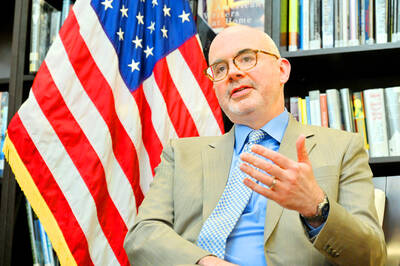Taiwan’s decade-long ban on Japanese food imports from five Japanese prefectures following the 2011 Fukushima Dai-ichi nuclear power plant disaster would be a key topic in bilateral negotiations now that Taiwan has applied to join a Tokyo-led trade bloc, said Minister Without Portfolio John Deng (鄧振中), who heads the Cabinet’s Office of Trade Negotiations.
The government needs to deal with its ban on imports of agricultural and food products from the five prefectures, Deng said in an interview with the Central News Agency.
Although the Japanese government has said it would not make the issue’s resolution a condition for its support of Taipei’s bid to join the Comprehensive and Progressive Agreement for Trans-Pacific Partnership (CPTPP), Deng said the dispute has to be dealt with sooner or later.
“Taiwan will bring the issue to the negotiation table once both sides begin official talks on joining the CPTPP,” he said.
Some of the issues likely to be discussed during bilateral talks on lifting the ban would include specifying what kind of food and agricultural products would be allowed into Taiwan, which government agency would be responsible for inspecting the products imported from Japan and what kind of documents would be needed, he said.
“Whether to lift the ban will be decided based solely on scientific evidence,” he added.
Taiwan applied to join the CPTPP on Sept. 22.
It is in talks with all 11 members of the bloc to seek their support and learn about their pressing issues, Deng said.
Talks with Australia and Singapore are not expected to be too challenging, as Taiwan has no major trade disputes with them, he said, but added that talks with Vietnam are expected to be thorny, as Taipei and Hanoi compete in agricultural exports.
Taiwan’s application to join the CPTPP came less than a week after China also applied for membership, suggesting a rush by Taipei in response to Beijing’s bid.
Asked if he was worried that China would join the CPTPP before Taiwan, as was the case with the WTO, Deng said that during the early 2000s, economies around the world had high expectations of China, which was experiencing a significant economic boom at the time.
“How does the world see China now?” Deng asked.
Accession to the CPTPP requires a unanimous decision by all members, he said, adding that Australia, which is facing economic sanctions from China, has voiced its objection to Beijing’s bid.

SEPARATE: The MAC rebutted Beijing’s claim that Taiwan is China’s province, asserting that UN Resolution 2758 neither mentions Taiwan nor grants the PRC authority over it The “status quo” of democratic Taiwan and autocratic China not belonging to each other has long been recognized by the international community, the Mainland Affairs Council (MAC) said yesterday in its rebuttal of Beijing’s claim that Taiwan can only be represented in the UN as “Taiwan, Province of China.” Chinese Minister of Foreign Affairs Wang Yi (王毅) yesterday at a news conference of the third session at the 14th National People’s Congress said that Taiwan can only be referred to as “Taiwan, Province of China” at the UN. Taiwan is an inseparable part of Chinese territory, which is not only history but

CROSSED A LINE: While entertainers working in China have made pro-China statements before, this time it seriously affected the nation’s security and interests, a source said The Mainland Affairs Council (MAC) late on Saturday night condemned the comments of Taiwanese entertainers who reposted Chinese statements denigrating Taiwan’s sovereignty. The nation’s cross-strait affairs authority issued the statement after several Taiwanese entertainers, including Patty Hou (侯佩岑), Ouyang Nana (歐陽娜娜) and Michelle Chen (陳妍希), on Friday and Saturday shared on their respective Sina Weibo (微博) accounts a post by state broadcaster China Central Television. The post showed an image of a map of Taiwan along with the five stars of the Chinese flag, and the message: “Taiwan is never a country. It never was and never will be.” The post followed remarks

INVESTMENT WATCH: The US activity would not affect the firm’s investment in Taiwan, where 11 production lines would likely be completed this year, C.C. Wei said Investments by Taiwan Semiconductor Manufacturing Co (TSMC, 台積電) in the US should not be a cause for concern, but rather seen as the moment that the company and Taiwan stepped into the global spotlight, President William Lai (賴清德) told a news conference at the Presidential Office in Taipei yesterday alongside TSMC chairman and chief executive officer C.C. Wei (魏哲家). Wei and US President Donald Trump in Washington on Monday announced plans to invest US$100 billion in the US to build three advanced foundries, two packaging plants, and a research and development center, after Trump threatened to slap tariffs on chips made

CONSISTENT COMMITMENT: The American Institute in Taiwan director said that the US would expand investment and trade relationships to make both nations more prosperous The US would not abandon its commitment to Taiwan, and would make Taiwan safer, stronger and more prosperous, American Institute in Taiwan Director Raymond Greene said. “The US’ commitment to Taiwan has been consistent over many administrations and over many years, and we will not abandon our commitment to Taiwan, including our opposition to any attempt to use force or coercion to change Taiwan’s status,” he said in an exclusive interview with the Liberty Times (the sister newspaper of the Taipei Times) on Friday last week, which was published in the Chinese-language newspaper yesterday. The US would double down on its efforts